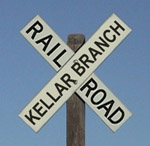 On the City Council agenda this week is an agreement — one of a “series of agreements” — that will pave the way (get it?) for a portion of the Kellar Branch to be abandoned so it can be converted to a recreational trail.
On the City Council agenda this week is an agreement — one of a “series of agreements” — that will pave the way (get it?) for a portion of the Kellar Branch to be abandoned so it can be converted to a recreational trail.
This agreement is pretty mundane. It just sets out how Central Illinois Railroad (CIRY) and Pioneer Industrial Railway (PIRY) will share trackage rights on the portion of the branch that remains, as well as the western connection to the Union Pacific line.
However, there is a mysterious, new entity that has popped up in the agreement: something called the “Kellar Branch Corridor Corporation.” According to the Secretary of State, it’s a not-for-profit organization incorporated in October 2008 by Thomas Leiter. You know Tom Leiter — that’s Alexis Khazzam’s father-in-law. Khazzam is a big recreational trail supporter. It seems this corporation has signed some sort of “Leasehold Purchase Agreement” with both CIRY and PIRY in October and November of last year.
Basically what this means is that Tom Leiter has somehow bought out CIRY and PIRY’s interest in all or part of the line. I can only presume he’s done the same with Carver Lumber, although it’s not explicitly stated in this, the first in a “series of agreements.” I wrote to city attorney Randy Ray asking for more details, but all he would say is:
I will try to get answers to all of [your questions]. For now, I will answer that the plan is to build a trail between Candletree and Park, with Carver being served from the West. This result is contingent on other things happening and is not assured by the Agreement on the agenda.
Well, we know that it’s more expensive to get rail service from the west. If that were feasible, the Kellar Branch would have been abandoned years ago. So, what’s changed? Only the creation of the mysterious “Kellar Branch Corridor Corporation” and its “Leasehold Purchase Agreements.” Sounds to me like some money has changed hands, and everyone’s willing to let the Kellar Branch be abandoned now. What they couldn’t do through lawsuits and regulators, they appear to have succeeded in doing with a little filthy lucre.
So money talks. What’s new? Well, here’s what we need to keep an eye on: who’s money? If it’s Tom Leiter’s, well, that’s his affair. But if one of these future agreements involves the Peoria Park District or the City of Peoria giving a large chunk of taxpayer money to Tom Leiter in return, that’s a different story. Somehow I just have a feeling that the taxpayers are the ones who are going to end up financing this scheme.
Ya gotta love the secrecy of Peoria politics. This has clearly been going on for more than nine months, yet this is the first time we’re hearing about it (publicly, anyway), and only because it has to be approved at an open meeting. Even then, they’re going to trickle out the agreements over time, so we can only see the full picture after it’s too late for the public to make any objections. A brilliant, albeit underhanded, plan.
Congratulations to the trail enthusiasts. It seems likely they will finally get what they’ve coveted for so long. Between this and the pending museum, Utopia is clearly just around the corner.
